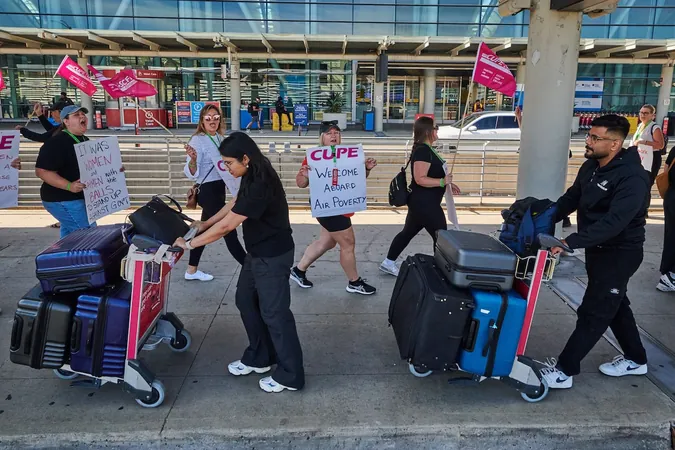
Air Canada Flight Attendants Reject Wage Deal: What's Next?
2025-09-09
Author: Benjamin
Major Labor Dispute Intensifies at Air Canada
In a significant turn of events, Air Canada flight attendants have overwhelmingly rejected a recent wage agreement, propelling the ongoing labor dispute into uncharted territory. With approximately 10,000 flight attendants represented by the Canadian Union of Public Employees (CUPE), both parties are now gearing up for mediation to negotiate a new collective agreement following the expiration of the previous one in March.
What is Mediation?
Mediation is a collaborative approach where a neutral third party assists both the union and the employer in navigating their differences. It allows each side to express their interests and explore creative solutions to their conflicts. According to the Government of Canada, mediation facilitates respectful negotiations designed to yield mutually satisfactory outcomes.
Why Mediation Now?
Air Canada and CUPE have turned to mediation after a staggering 99.1% of flight attendants voted against a tentative deal that was reached in August. This came on the heels of a nationwide strike initiated by flight attendants over issues including unpaid work. Despite a federal back-to-work order, the strike lasted three days, disrupting both domestic and international flights.
The tentative deal included groundbreaking compensation for unpaid work, with flight attendants set to receive ground pay leading up to takeoff and after landing—a key sticking point that encapsulated their concerns.
The Sticking Point: Wage Increase
Once the voting concluded on September 6, flight attendants rejected a proposed wage increase of 20.25% over four years for those with five years of service and 16.25% for those with six or more years. This rejection has intensified the urgency for mediation.
What If Mediation Fails?
Should negotiations falter during mediation, the matter will escalate to an arbitrator from the Canada Industrial Relations Board. In this scenario, the arbitrator will determine the wage increase, a decision that will be binding and cannot be contested by either party. This process is intended to sidestep the uncertainty of further strikes.
Understanding Arbitration
Arbitration occurs when both sides are unable to secure an agreement through mediation. Here, an arbitrator—who serves as a neutral entity—does not facilitate discussion but rather listens to evidence from both parties. Their final ruling is legally binding and must be adhered to by both Air Canada and CUPE.
Will There Be More Strikes?
As it stands, both parties have committed to avoiding any labor disruptions during the mediation process, meaning that flights will continue to operate without the threat of strikes or lockouts, at least for the time being.









 Brasil (PT)
Brasil (PT)
 Canada (EN)
Canada (EN)
 Chile (ES)
Chile (ES)
 Česko (CS)
Česko (CS)
 대한민국 (KO)
대한민국 (KO)
 España (ES)
España (ES)
 France (FR)
France (FR)
 Hong Kong (EN)
Hong Kong (EN)
 Italia (IT)
Italia (IT)
 日本 (JA)
日本 (JA)
 Magyarország (HU)
Magyarország (HU)
 Norge (NO)
Norge (NO)
 Polska (PL)
Polska (PL)
 Schweiz (DE)
Schweiz (DE)
 Singapore (EN)
Singapore (EN)
 Sverige (SV)
Sverige (SV)
 Suomi (FI)
Suomi (FI)
 Türkiye (TR)
Türkiye (TR)
 الإمارات العربية المتحدة (AR)
الإمارات العربية المتحدة (AR)